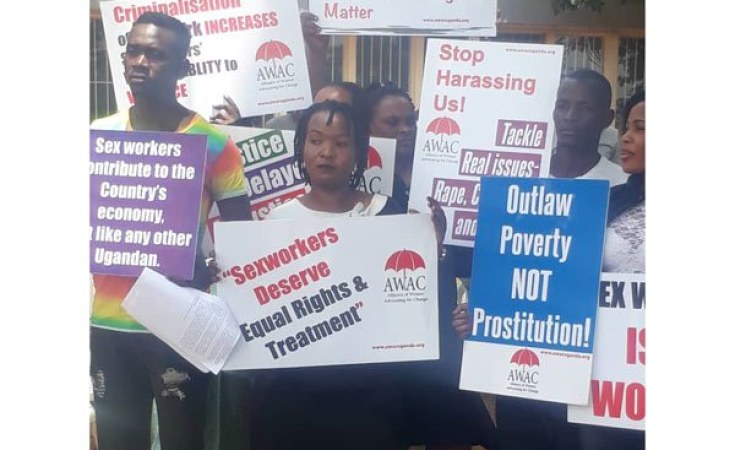It is midnight sharp. Most shops and bars in Kigali have closed but at Migina, the ladies of the night are standing in strategic places.
In Kigali, Migina is known for commercial sex workers. The area is also referred to as Isoko rindaye--commercial sex market.
It became a popular commercial sex market after the 1994 Genocide when young girls would hang around Migina a short distance from UN Camp.
"The UN guys who used to pay 'a lot' of money to the girls for sex," said Anthanase Iyamuremye, a legal representative for Hope for Living, a human rights activist group in Rwanda.
Sixteen years after the genocide, the place has remained popular for commercial sex workers.
Some occupy corridors while others stand in dimly light corners of the bars lined opposite Amahoro Staduim in Remera, East of Kigali.
One striking thing about the ladies of the night in Kigali is they are decently dressed. In Kigali they are either wear jeans or skirts covering their knees.
The ladies of the night will also refrain from approaching potential customers. The customer has to approach them and ask for their services.
Christine Uwase, 24, is one of the sex workers at Migina. She explains that the women there are decent because Rwandan society norms dictate a woman has to always dress decently.
However, at the same time she adds the women are withdrawn because "commercial sex is not part of the Rwanda culture."
Uwase claims she left her village two months ago to start peddling her body, reportedly for survival.
However, she says, the work comes with numerous risks. "The daily harassment from police deployed in the area forces us to camouflage," says Uwase. "When police come they arrest whoever they suspect to be a sex worker...to beat the security detail in the area we have to look like revelers."
Wearing a jeans trouser, tightly fitting her body, Uwase is nevertheless an attraction to men. Within 20 minutes three men approach her but not all of them succeed in taking her that night.
When asked why she is turning down the men, Uwase said they were not paying enough.
"The price here depends on the time we shall spend together and whether we shall leave the work station," said Uwase. "A shot is Rwf3000 while the whole night costs a man Rwf7000."
She says all three guys offered to pay less yet they wanted to take her out of the work station. Leaving with a man to his home increases the risk of being abused. "At times they use you and refuse to pay," she explains.
Uwase is part of the estimated 6500 prostitutes Hope for Living claim exist in Rwanda according to a 2004 census. "Kigali has 70 percent," says Anthanase Iyamuremye, the legal representative Hope for Living.
The high number of commercial sex workers in Rwanda is putting decision makers in the country at a crossroads, with some saying it should be legalized while purist say it should remain criminalized.
According to The New Times, Deputy Speaker of Parliament, Jean Damascene Ntawukuriryayo, has said that parliament could revisit a prospective law outlawing prostitution that is currently before the Senate.
Article 221 of the Penal code on sex workers says: "Any person who practices the profession of prostitution shall be liable for a term of imprisonment ranging from six months to three years and a fine ranging from fifty thousands to five hundred thousand Rwanda Francs."
The 600-article penal code has been passed by the Chamber of Deputies with the article but it is currently in the Senate awaiting scrutiny by the Senatorial ad hoc committee.
"As long as the Penal code document has not been fully approved, it can always be reversed for revision but it is up to the plenary to decide on whether the article should be repealed or not," Ntawukuriryayo told The New Times.
Ntawukuriryayo's comments come shortly after UNAIDS Regional Director - Eastern and Southern Africa, Prof Sheila Tlou, appealed to legislators not criminalise prostitution.
However, Ntawukuriryayo's added that his concerns were on how to determine a sex worker in Rwanda.
"There is no way you will charge someone for practicing prostitution without a clear basis, but all these issues are subject to debate," he said.
When visiting the country, Prof. Tlou outlined the potential implications of outlawing prostitution.
"I humbly request, through the Speaker of Parliament, that honourable members of the Rwandan Parliament and Senators take the opportunity to use this Country Action Plan to examine the evidence around HIV infection among sex workers and to repeal Article 221 of the draft penal code," said Prof. Tlou.
Although the concern on criminalisation of prostitution is just coming up, the article is not new in the penal code; actually, it is one of the articles that were not amended while the document was being amended.
While officially opening a two-day partnership meeting on HIV and human rights advocacy towards intensification of HIV prevention on sex workers at Serena Hotel on Tuesday, Florida Mutamuliza, an official from the National Commission for the Fight against AIDS (CNLS), said criminalizing and denying the existence of sex workers is a threat to curbing the spread of HIV/AIDS in the country.
"If sex workers are ignored and considered criminals, they will remain in hideouts and it will be difficult for every organisation or commission fighting AIDS to identify them," Mutamuliza observed. She says what has been done to date is just like a drop in the ocean. "More effort is needed to positively change the lives of sex workers and Rwandans in general," Mutamuliza said.


